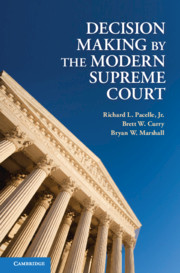Book contents
- Frontmatter
- Contents
- Acknowledgments
- 1 The Supreme Court
- 2 Heuristic Models of Judicial Decision Making
- 3 Building an Integrated Model of Decision Making
- 4 Decision Making on the Modern Supreme Court
- 5 Building a New Legacy
- 6 Sharing the Protection of Minorities
- 7 Avoiding Another Self-Inflicted Wound
- 8 Policing the Boundaries
- 9 Conclusion
- Measurement Appendix
- Cases Cited
- References
- Index
1 - The Supreme Court
The Nation's Balance Wheel
Published online by Cambridge University Press: 05 June 2012
- Frontmatter
- Contents
- Acknowledgments
- 1 The Supreme Court
- 2 Heuristic Models of Judicial Decision Making
- 3 Building an Integrated Model of Decision Making
- 4 Decision Making on the Modern Supreme Court
- 5 Building a New Legacy
- 6 Sharing the Protection of Minorities
- 7 Avoiding Another Self-Inflicted Wound
- 8 Policing the Boundaries
- 9 Conclusion
- Measurement Appendix
- Cases Cited
- References
- Index
Summary
On the steps of the courthouse, she typically sits. Inside the courtroom, she usually stands. Regardless, she has a sword at her side, ready if necessary. She holds the scales of justice, and most often she is blindfolded. The Greeks called her Themes, the goddess of order and law. The Romans had a name that more closely reflects our language: Justicia. She is the symbol of the legal system in the United States. She represents the notion that justice is blind and should be meted out objectively, without regard to the identity of the supplicants. Whether known as Themes, Justicia, or Lady Justice, she is a normative icon.
If she has a modern embodiment in the American legal system, it is the nominee for a seat on the United States Supreme Court. Note that we did not say the justices of the Supreme Court; we said the nominees – most of them, anyway. When there is a vacancy on the Court, the stakes are high. Of course, if Justice truly were blind and prospective justices truly nonpartisan, it would not matter whom the president selected to ascend to the high bench as long as he or she were eminently qualified. And to the untrained eye, this is what appears to be the case, as the carnival that is the nomination process moves into the national limelight. When the nominee sits before the gatekeeper, the Senate Judiciary Committee, the chosen one appears to be the paragon of judicial temperament and objectivity.
- Type
- Chapter
- Information
- Decision Making by the Modern Supreme Court , pp. 1 - 26Publisher: Cambridge University PressPrint publication year: 2011
- 2
- Cited by



